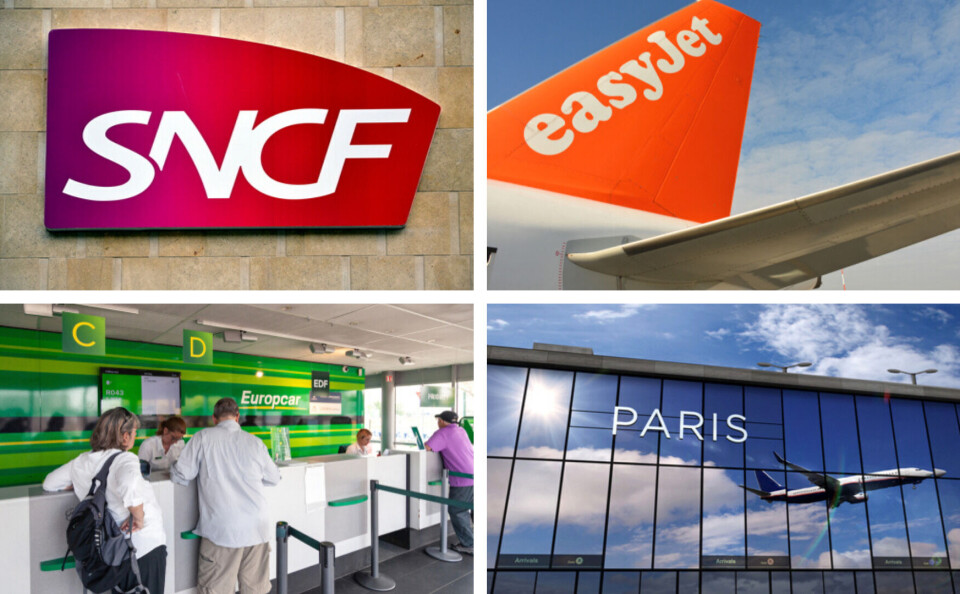-
Pistes closed, confinement orders: Alpine resorts deal with avalanche risk
Increased snowfall this weekend may cause further closures as busy school holiday season continues
-
Former French Interior Minister announces 2027 presidential candidacy
Bruno Retailleau recently asked prefectures to be tough on immigration
-
Ryanair axes Dublin-Rodez route but London connection retained
“We are disappointed but had no say in decision” say airport authorities
France fears holiday bottleneck as transport system almost overwhelmed
Planes, trains, and cars: Rising ticket costs and vehicles shortages may cause chaos this summer, although demand shows no sign of dropping

The holiday season may be more fraught than planned in France as plane and train ticket sales reach pre-pandemic and record levels, and hire car companies report they are almost at capacity.
Ticket sales at Air France are at 90% of pre-pandemic levels for the summer so far, the airline said, while Ryanair, EasyJet and Lufthansa are at record levels full stop, for the months of July and August.
Rising fuel costs and consequent ticket increases do not appear to be deterring passengers from taking summer breaks after two pandemic years.
However, industry experts have warned that it may take transport companies some time to catch up with this unexpected demand.
Planes
Benjamin Smith, director-general of Air France-KLM, said: “Clients will not see the same level of service they did in 2019. In my home country, Canada, we are seeing planes waiting for up to two and half hours before being able to arrive at the gate.
“In the US, many transport companies are being forced to cancel a significant number of flights this summer.”
Paris airports are also expected to be affected, said Augustin de Romanet, CEO of ADP, which manages Paris-Orly and Paris-Roissy Charles de Gaulle. Yet, he appeared optimistic.
He told Le Figaro: “This quick return, which will cause queues at the borders this summer, is being seen all over Europe and will cause difficulties. But they will happily be short-lived.”
Read more: France so far escapes worst of EasyJet's 200 Gatwick cancellations
Yet, France is unlikely to avoid issues that are already being seen elsewhere in Europe.
Last Sunday, more than 1,000 people missed their flights at Dublin airport, due to huge queues at security. In Amsterdam, passengers had to wait for more than an hour to enter the airport, and scuffles broke out among the public and security guards.
In the UK, Ryanair asked its customers at London Stansted to check in their luggage the day before because the airport was so congested, and airlines have cancelled hundreds of flights from England in recent weeks.
Overall, 66% of European airports are expecting more delayed flights this summer, and 16% more cancelled flights.
The health crisis and a lack of staff are among the root causes of the issue, as well as a shortage of pilots in the US and UK.
The issue has not been as severe in France because of different kinds of work contracts in the country, although pilot shortages in other countries may have a knock-on effect.
EasyJet has also confirmed that flights to and from the UK are likely to have fewer cabin staff.
Another problem is the shortage of ground staff, which includes baggage handling, security checks, passenger check-in, and boarding. This can also have a knock-on effect on the speed of boarding and passenger flow.
Trains
SNCF is running a similar level of services as it did pre-pandemic, although customers appear to be feeling the impact of rising prices.
One Twitter user, Carolina, said: “It would be really nice if trains cost less than planes. Paying €200 to cross France [by train], and then it costs €50 by plane - it’s just impossible.”
French statistics bureau Insee confirmed that the price of train tickets had jumped by 15.3% between January and April, and that inflation in tickets had jumped 14.6% between April 2021 and 2022. Similarly, SNCF has also suffered from rising electricity prices.
However, CEO of SNCF Voyageurs, Christophe Fanichet, said: “In 2022, we will not increase train ticket prices on the major SNCF lines.”
Train prices have also risen less than those of airline tickets (which have risen 22.4%).
Car hire
High demand for hire cars has also caused prices to soar. Biarritz is the most-affected region in France, with customers set to pay an extra €505 per week for a car at peak times, a study by car hire price comparison website Carigami said.
Read more: Rise of private car rentals in France to beat company prices
Pierre Feisthauer, Carigami's development manager, said: “The rate has almost doubled in two years (+96.4%) in this city, because more luxury cars are rented there, and it combines all the factors that drive up prices everywhere in France.”
Other high-demand cities include those in Corsica especially, including Ajaccio, Bastia, and Figari.
Hire car prices have risen nationwide compared to 2019, at 41.3% on average, equalling €369 per week, not including fuel.
This is partly because many hire car companies reduced their fleets during 2020, as business slowed to a halt due to the health crisis. Then, the shortage of semiconductors meant that it was not always easy to repurchase cars when business began to increase again.
Frédéric Pilloud, digital director of booking agency MisterFly, said: "The rental car has become a rare commodity, just like sunflower oil or mustard.”
Cédric Douls, sales director of Europcar, added: "The car rental world has completely changed since 2019. Before the pandemic, growth was driven by the increase in the number of tourists and the number of vehicles. Today, customers, especially foreign ones for us, are back, but the vehicles are not."
Related articles
Covid-19: Rules for travel to and from France
France so far escapes worst of EasyJet's 200 Gatwick cancellations
UK-France flight cancellations, ferries, Navigo: eight travel updates
























